Start Your Free Trial!
Sign up to our newsletter, stay updated on news and exclusive offers from EaseUS. Don't worry, if you change your mind, you can unsubscribe at any time, free of charge. We value your privacy (Privacy Policy).
Page Table of Contents
Quick Fixes to Windows 10 Won't Install on SSDHOT
Method 1. Convert the Disk to GPT/MBRHOT
Method 2. Recreate the Windows Installation Media and Install Windows 10HOT
Method 3. Use the Windows 10 Media Creation ToolHOT
BONUS: Turn to Windows Installation ServiceHOT
Why Windows 10 Won't Install on SSDHOT
ConclusionHOT
FAQs About Windows 10 Won't Install on SSDHOT
About the Author
Hot Topics
Updated on Apr 28, 2025
Windows 10 won't install on SSD can be due to computer hardware, SSD error, or installation media error. There are also reasons, such as outdated BIOS, that may cause SSD not showing up during Windows 10 installation.
If you have purchased a new SSD or HDD and are facing problems installing Windows 10. Don't worry, EaseUS Software gives a comprehensive guide to fix Windows 10 can't install on SSD:
| ⏱️Duration | 5-8 minutes of reading |
| 🧑💻Suitable for | Windows 10/11 won't install on SSD, can't install Windows on SSD/HDD |
| 🧰Tools | SSD, EaseUS Partition Master, Windows Media Creation Tool |
| ✏️Solutions |
✔️Quick Fixes to Windows 10 Won't Install on SSD ✔️Recreate the Windows Installation Media and Install Windows 10 |
When you can't install Windows 10 on SSD, you can try the following quick solutions:
If the above methods can't help you fix the problem that Windows can't be installed on SSD/HDD, please try more effective solutions.
For other solutions to install Windows without product key, please check the following article:
How to Install Windows 10 Without Product Key
You can install Windows 10 without product key by downloading the Windows 10 ISO from Microsoft. This page will offer a comprehensive solution on how to do it.
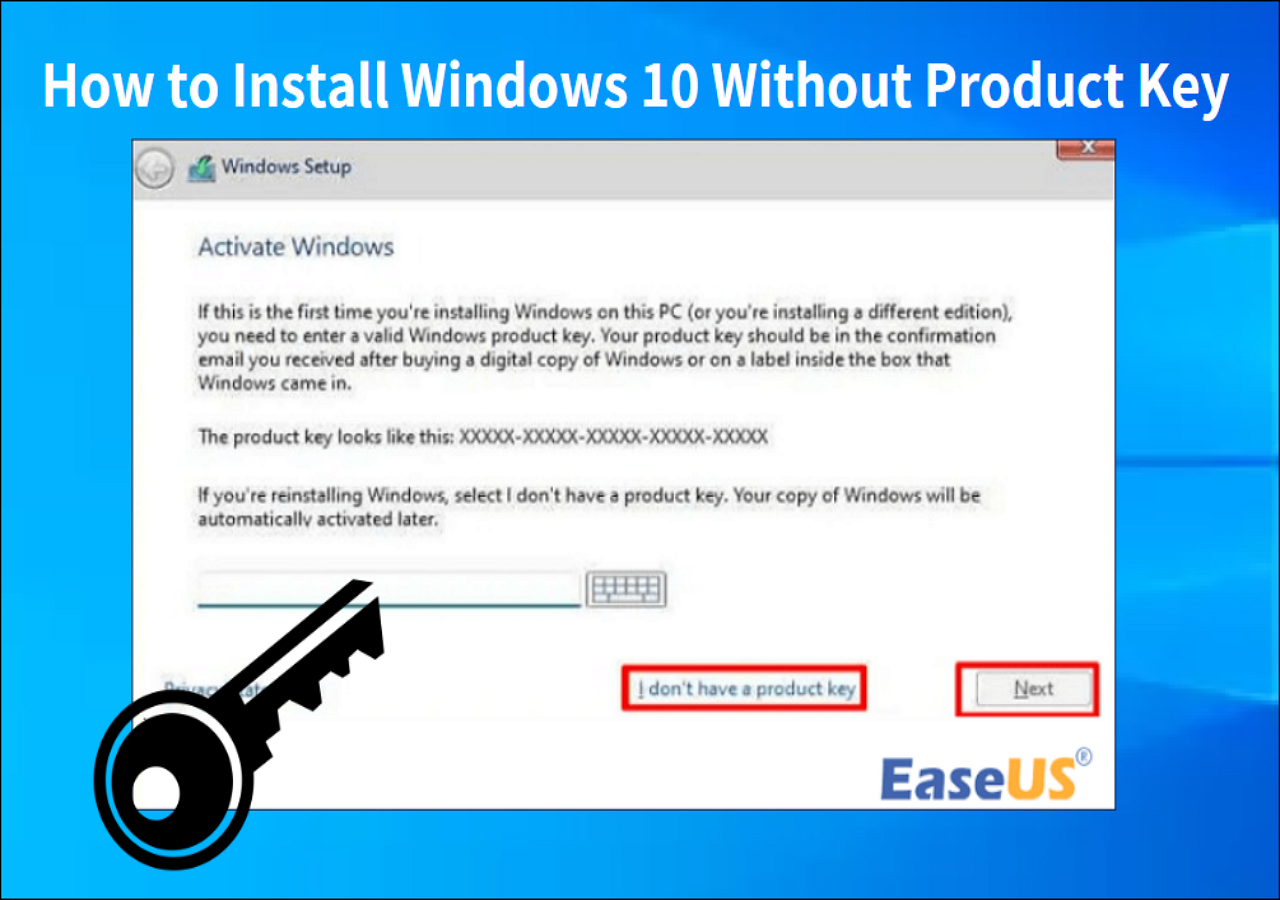
If you are using Legacy boot mode, you need to convert SSD to MBR. If your Windows 10 computer supports UEFI boot mode, you can go to BIOS setup and enable UEFI mode. Windows can only be installed on a GPT disk in EFI system mode. Please use EaseUS Partition Master to convert MBR to GPT easily.
EaseUS Partition Master Professional is a reliable partition management tool. It can easily perform various advanced operations without losing data, such as converting FAT to NTFS, resizing partitions, etc. It provides a simple interface for all users to operate.
Step 1. Download and launch EaseUS Partition Master on your computer.
Step 2. Go to Disk Converter, select "MBR => GPT" and click "Next" to continue.
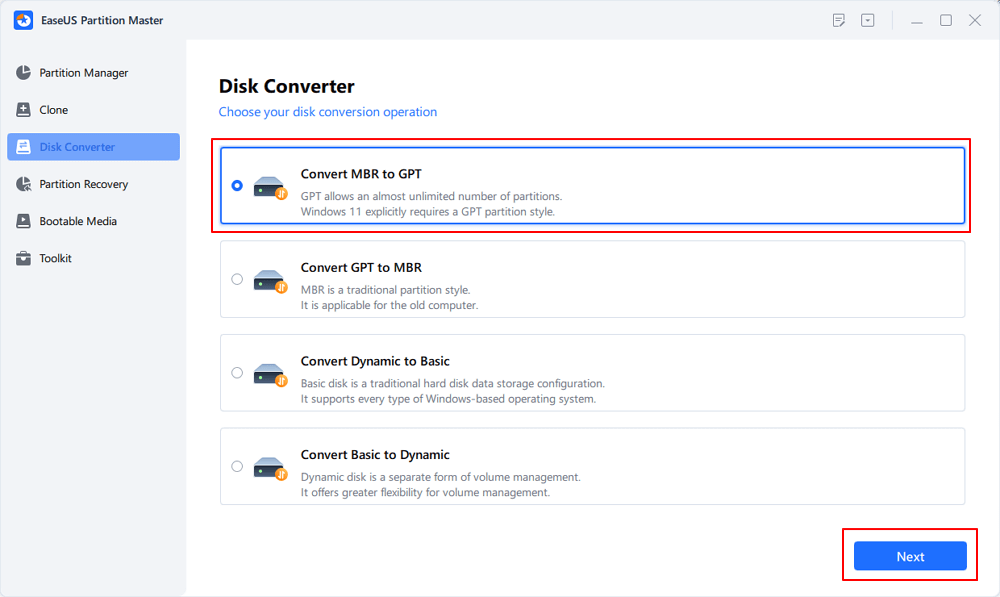
Step 3. Select the target MBR disk that you tend to convert to GPT, and click "Convert" to start the conversion.
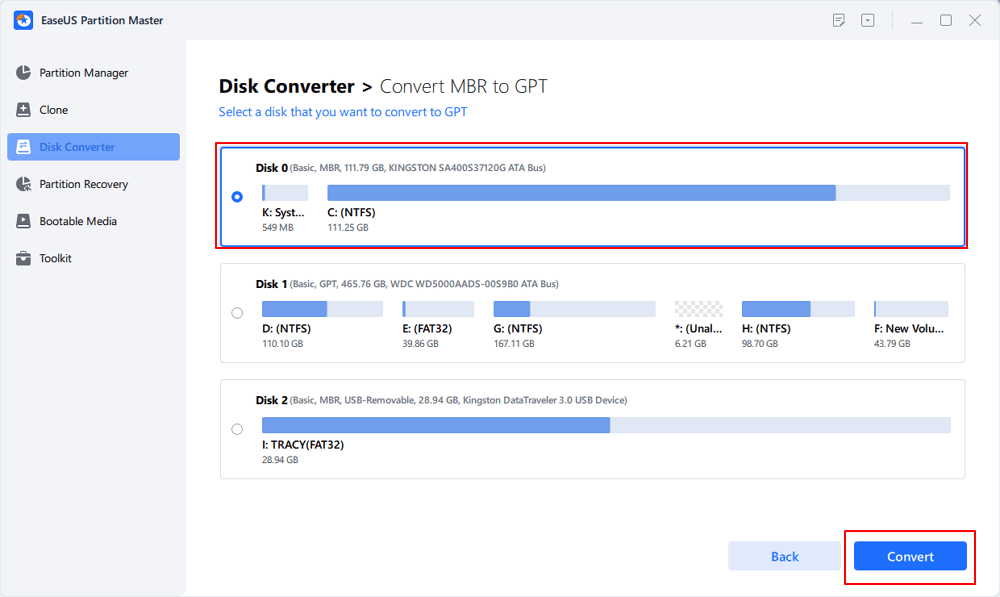
If Windows 10 can display SSD but still have the problem of not being able to install Windows 10, please try to convert GPT to MBR.
When the Windows installation media or ISO file is corrupted, you may be unable to install Windows on SSD. Please recreate the Windows installation media and freshly install Windows 10/11 on the SSD or install Windows 10 on M.2 SSD:
Stage 1. Get the Microsoft Windows 10 ISO file:
https://www.microsoft.com/en-us/software-download/windows10
Stage 2. Burn the ISO file using EaseUS Partition Master
Please prepare a FAT32 formatted USB and download EaseUS Partition Master - a professional ISO burner. It can burn ISO files successfully and create bootable installation media.
Step 1. Launch EaseUS Partition Master and go to the Bootable Media section. Click "Burn ISO" and click "Next".
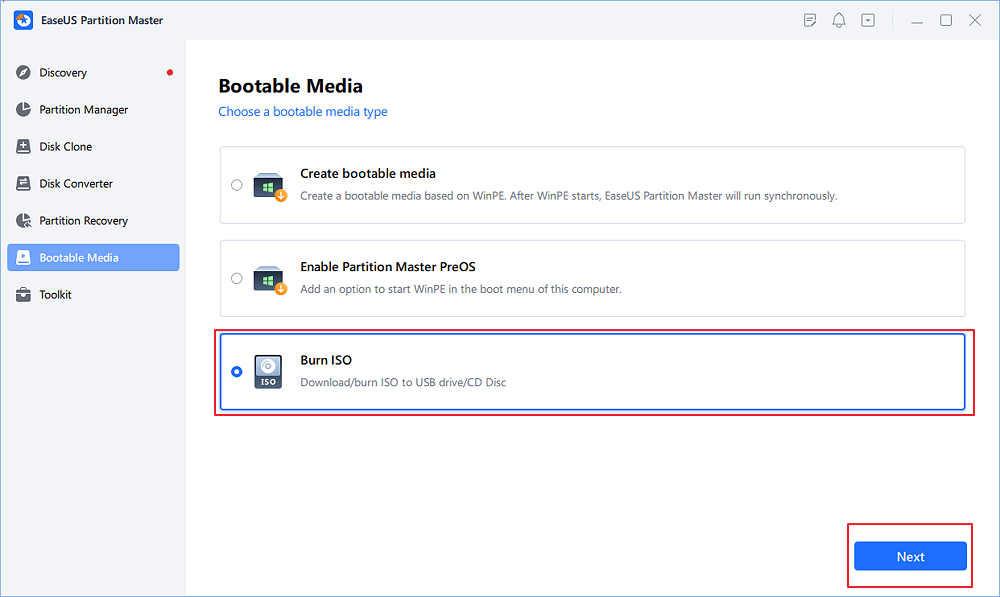
Step 2. Select the ISO image that you have downloaded on your PC, and click "Open".
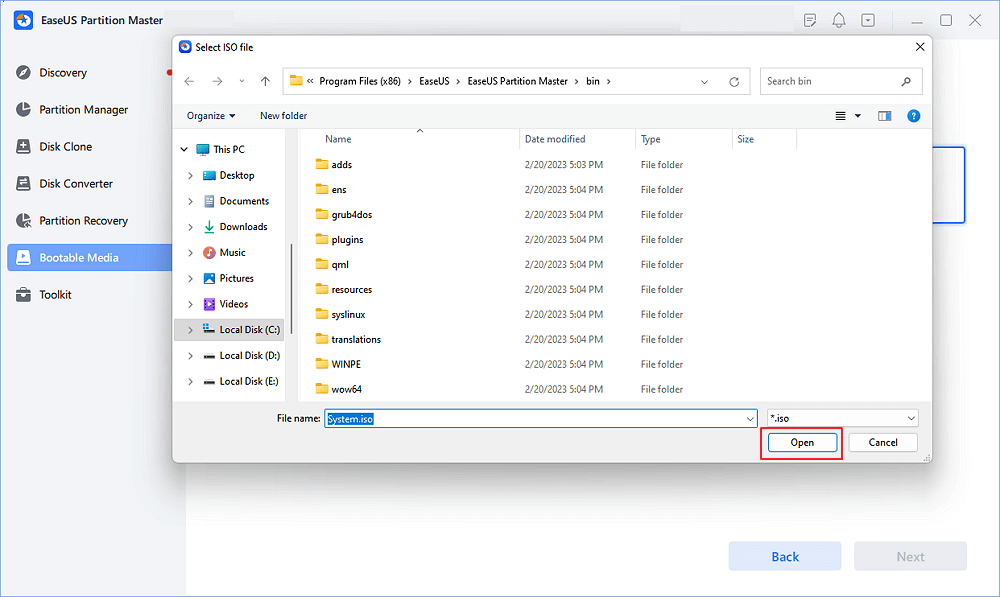
Step 3. Click "Next" and select the target USB as destination and click "Burn" to execute the operation.
EaseUS Partition Master also support to burn Windows 11 23H2 ISO to USB. Download it and you can enjoy its benefits.
Stage 3. Change the Boot Order and Boot from USB
Stage 4. Install Windows on SSD
Enter Windows from the USB and click Install Now. Provide the product key during the installation process and install Windows 10 on this computer by selecting "Custom: Install Windows only(advanced)."

Wait for the Windows 10 installation to finish after following the on-screen instructions to set up Windows.
You May Also Like:
If the Windows media is corrupted and you are unable to use the SSD, you can go ahead and use the Windows 10 Media Creation Tool to reset this computer to reinstall Windows 10:
Step 1. Visit the Microsoft software download site and download the Windows 10 Media Creation Tool.
Step 2. Choose the language, edition, and architecture when prompted to create installation media for a different computer.

Step 3. Create the installation media by following the instructions.
Step 4. Run and open the created installation media, enter the language and other preferences, and click Next.
Step 5. Select Repair your computer > Select an option > Troubleshooting > Advanced Options > System Restore.

Step 6. Click Reset this computer to install Windows 10 again.
For non-technical users, it could still be complex to get rid of the Windows 10 installation failure error on SSD disk drives. Relax, and you'll need professionals' help. EaseUS experts with roundup solutions are here to help.
EaseUS Windows Configuration Services
Click here to contact EaseUS Partition Master experts for free
EaseUS experts are available to provide you with 1-on-1 manual services (24*7) and help fix different Windows configuration issues. Our experts will offer you FREE evaluation services and efficiently diagnose and resolve Windows update errors, Windows installation, or daily OS issues using their decades of experience.
Many users have discussed on forums that Windows 10 won't install on a brand-new SSD. Here is a typical case:
Don't worry. This article provides you with a detailed solution. Besides that, we will analyze the reasons that may cause Windows 10 can't be installed on SSD or HDD, such as:
Please follow the solution in this article to fix Windows 10 won't install on SSD. Don't forget to share it to help more people in need!
If you're having trouble installing Windows 10/11 on a new SSD, I hope this guide will help. You can choose the right solution for your situation. Be sure to convert the SSD to the correct MBR or GPT format using EaseUS Partition Master before making other fixes. Then, use the rest of the options for troubleshooting.
This part provides more frequently asked questions and answers about Windows 10 won't install on SSD. Read on to solve your confusion.
1. Why is my SSD showing up in BIOS but not Windows install?
A variety of reasons may cause your SSD not to be detected when installing Windows:
To fix the issue, check out the detailed options in this article.
2. Why won't my SSD allow my PC to boot?
The main reasons why your computer won't boot on an SSD drive are the following:
3. Can I install Windows 10 directly on SSD?
Of course, you can install Windows 10 directly on the SSD, but please ensure the SSD is initialized with the correct partition style before installing.
How Can We Help You
Updated by Tracy King
Tracy became a member of the EaseUS content team in 2013. Being a technical writer for over 10 years, she is enthusiastic about sharing tips to assist readers in resolving complex issues in disk management, file transfer, PC & Mac performance optimization, etc., like an expert.
Cici is the junior editor of the writing team of EaseUS. She accepted the systematic training on computers at EaseUS for over one year. Now, she wrote a lot of professional articles to help people resolve the issues of hard drive corruption, computer boot errors, and disk partition problems.
It won't hot image your drives or align them, but since it's coupled with a partition manager, it allows you do perform many tasks at once, instead of just cloning drives. You can move partitions around, resize them, defragment, and more, along with the other tools you'd expect from a cloning tool.
Read MoreI love that the changes you make with EaseUS Partition Master Free aren't immediately applied to the disks. It makes it way easier to play out what will happen after you've made all the changes. I also think the overall look and feel of EaseUS Partition Master Free makes whatever you're doing with your computer's partitions easy.
Read MorePartition Master Free can Resize, Move, Merge, Migrate, and Copy disks or partitions; convert to local, change label, defragment, check and explore partition; and much more. A premium upgrade adds free tech support and the ability to resize dynamic volumes.
Read MoreIt won't hot image your drives or align them, but since it's coupled with a partition manager, it allows you do perform many tasks at once, instead of just cloning drives. You can move partitions around, resize them, defragment, and more, along with the other tools you'd expect from a cloning tool.
Read MoreI love that the changes you make with EaseUS Partition Master Free aren't immediately applied to the disks. It makes it way easier to play out what will happen after you've made all the changes. I also think the overall look and feel of EaseUS Partition Master Free makes whatever you're doing with your computer's partitions easy.
Read MoreRelated Articles
How to Make Dell Boot from USB on Windows 11/10
![]() Cici/2025/04/28
Cici/2025/04/28
How to Repair MBR on Windows Server (Two Quick Ways)
![]() Tracy King/2025/04/28
Tracy King/2025/04/28
Solved: SSD Not Showing Full Capacity After Clone
![]() Sherly/2025/04/28
Sherly/2025/04/28
How to Fix DBAN Not Booting From USB in Windows
![]() Cici/2025/04/28
Cici/2025/04/28
EaseUS Partition Master

Manage partitions and optimize disks efficiently
Your best companion for disk partitioning, MBR to GPT/GPT to MBR conversion,even OS migration
CHOOSE YOUR REGION
Start Your Free Trial!
Sign up to our newsletter, stay updated on news and exclusive offers from EaseUS. Don't worry, if you change your mind, you can unsubscribe at any time, free of charge. We value your privacy (Privacy Policy).
Start Your Free Trial!
Sign up to our newsletter, stay updated on news and exclusive offers from EaseUS. Don't worry, if you change your mind, you can unsubscribe at any time, free of charge. We value your privacy (Privacy Policy).